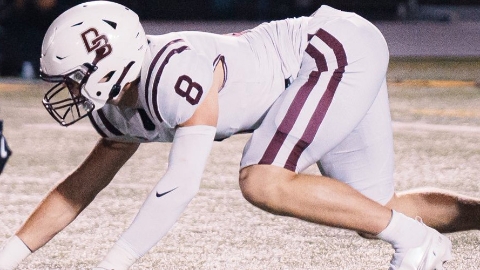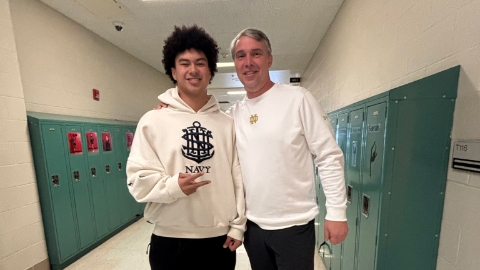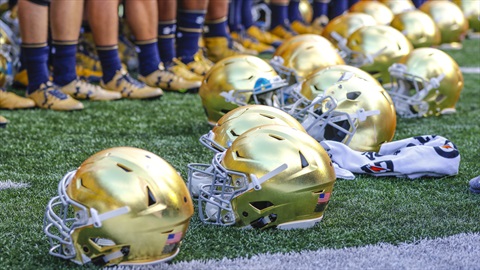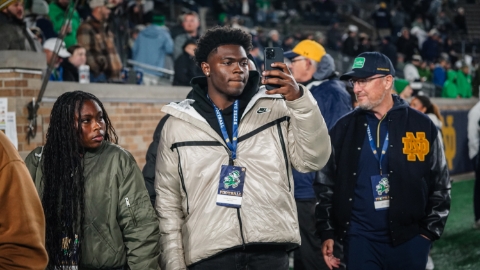Ray Mickens Schools Son, Elite 2020 CB RJ Mickens, On & Off Field
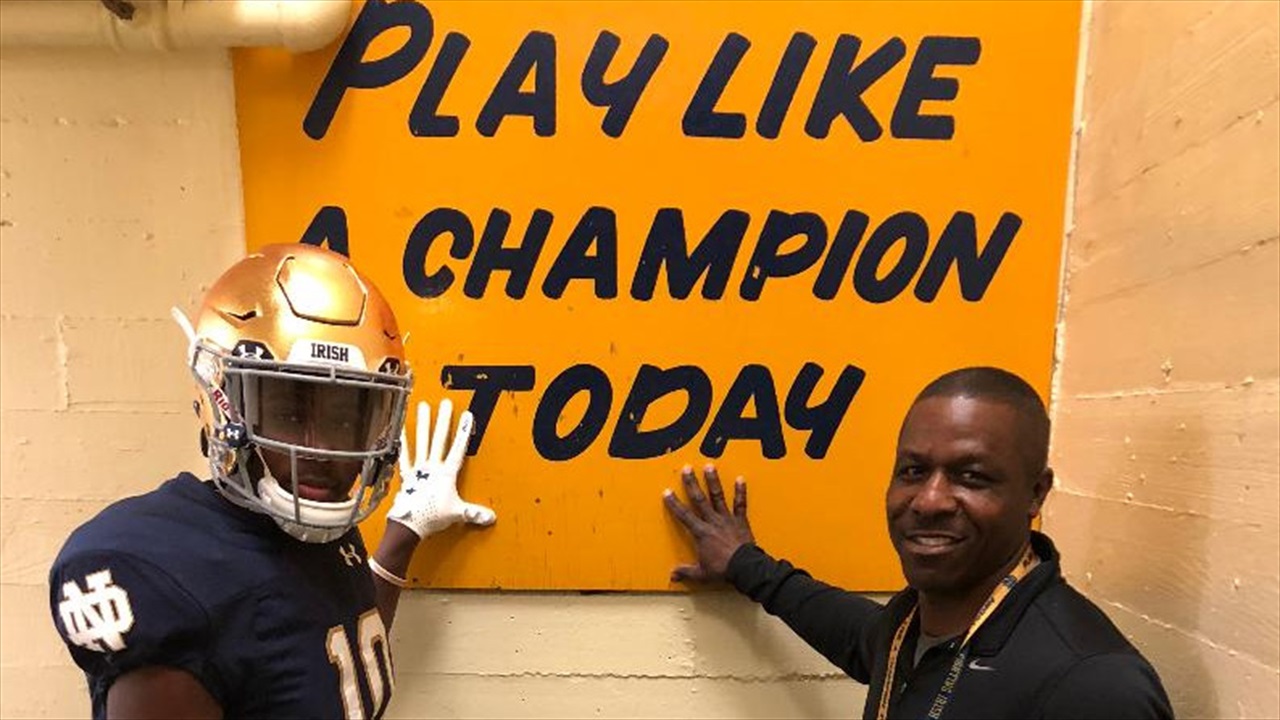
As an 11-year NFL veteran, Ray Mickens has always been well-positioned to school his son on the finer points of playing cornerback.
But, Mickens knew there was a line he wouldn’t cross.
RJ Mickens, who is now a standout cornerback in the 2020 class, started playing football when he was about seven years old while his father was still playing for the New York Jets, but started tossing a ball around much earlier than that.
“When he was two years old, three years old, four years old, he always wanted to throw balls with me when I was watching TV; bugging me on the couch and stuff,” Ray Mickens recalls.
As he got a little older, RJ started focusing in on football.
“When I was playing, he would definitely be attentive at the practices he would come to,” his father remembers. “He just developed a liking of the game and sports in general.”
Before long, Mickens noticed his son’s potential.
“He was playing some flag football when he was seven years old and he made a couple of kids miss and I said, ‘OK, I think he knows what he’s doing,’” says Mickens. “From there, he really got engaged with the game.
“I think he developed a love for the game at a young age and wanted to watch it on TV. I made sure that it was available for him to see on TV. I took him to some high school games when he was younger. He would only watch for the first quarter and then go play, but he was always wanting to be around it and asking if he could go watch the older kids.”
By the time RJ was in the sixth grade, his father really started imparting the knowledge he had.
“That’s when you’re able to really teach football,” Mr. Mickens says. “The first through the fifth grade was more so fundamental stuff and making sure they still have fun. Right around the fifth grade, we did some select football, where it started getting a little more serious and coaches started yelling a little more. You’re able to push the kids more when they develop the love for the game. That’s when he started getting pushed and I was able to teach him a little bit more in sixth grade, seventh grade and eighth grade.”
The acceleration of passing offenses has trickled its way all of the way down to the youth level, but many of the coaches at that level don’t truly know what they’re doing or how to do it.
“They’re trying to run it based on what they see on TV, but they really aren’t teaching the kids fundamental things that are going to stay with him,” Mickens explains. “That was kind of my goal, that got me wanting to coach a little bit to make sure my son learned the right things, so I started coaching youth football.”
Mickens possesses a wealth of knowledge even the best youth coaches don’t and he was sure to dispense it.
“The main thing was leverage, keeping your leverage based on where the football is and where the blockers are,” he says of the fundamentals he drilled most. “We did a lot of angle and leverage drills. We did a lot of ball skill drills, team ball drills. One thing that is tough even for NFL defensive backs to being able to judge the ball in the air and time your jump and things like that. Those were some of the fundamental things I was teaching RJ and the other kids.”
But at the same time, Mickens understood there were some things he wasn’t in the best position to deal with when it came to his son.
Mickens coached his older daughter, Kammi, in basketball when she was younger. She was a standout who would go on to play at Boston College and SMU, but their relationship was strained in the process.
“I regret it because she brought it home with here and I didn’t like that,” Mickens said of pushing his daughter while he was her coach. “I already knew from coaching my daughter not to get in an argument with him on the way home.”
Fortunately, Mickens knew somebody who could step in for him.
Enter Coach Reggie.
“I’m more of the good cop type of coach with the laidback attitude,” Mickens explains. “Then, I’ve got a guy who’s really rough and old-school. He taught him discipline like I couldn’t teach my own son.”
Mickens viewed the addition to the coaching staff as a “perfect” opportunity.
“RJ probably would have cried or got mad at me if I would have told to do some of the things that Coach Reggie told him to do,” Mickens explains. “He made him bear crawl 100 yards when he was nine years old and doing discipline things so they get the message that you have to give 100 percent all of the time. I think he learned that mental toughness and being disciplined at an early age.”
If his son screwed up, Mickens would bite his tongue.
“I’d get Coach Reggie on him right away,” he recalls. “I’d be like, “Reg, could you please handle this.’ He’d go cuss him out, yell at him, make him run. I understood that I couldn’t do that on a football field, so I never did that to my son.”
And even if RJ wanted to discuss it afterward, his father would resist, often putting him on the phone with Coach Reggie when they returned home.
“I was more of a dad on the drive home from practice and things like that when I coached,” he says. “He was really coached by the other coaches.”
And that opened a new avenue for Mickens to coach his son.
“I’d be like, ‘The reason why he did that is because of this,’” Mickens says. “I was able to explain to him why the coach was yelling at him. Actually, it worked out perfect because he started to understand and he was taking the criticism well in seventh grade and eighth grade. Coach Reggie didn’t care how good he was, he was going to yell at him for not doing things the right way.
“I was able to coach him through that part of it, saying, ‘Hey, he just wants you to get better. He wants to push you to be the best. He’s not yelling at Little Johnny because Johnny doesn’t have the same ability you have, so he’s going to be yelling at you more than Johnny.’ He’d say, ‘That’s not fair.’ I’d say well, ‘Well, look at the big picture. It is fair because you want more than Johnny wants right now. You want to be good and Coach Reggie just wants to make you better.’”
Those lessons proved extremely valuable as RJ entered Southlake Carroll High School, a Class 6A powerhouse in Texas.
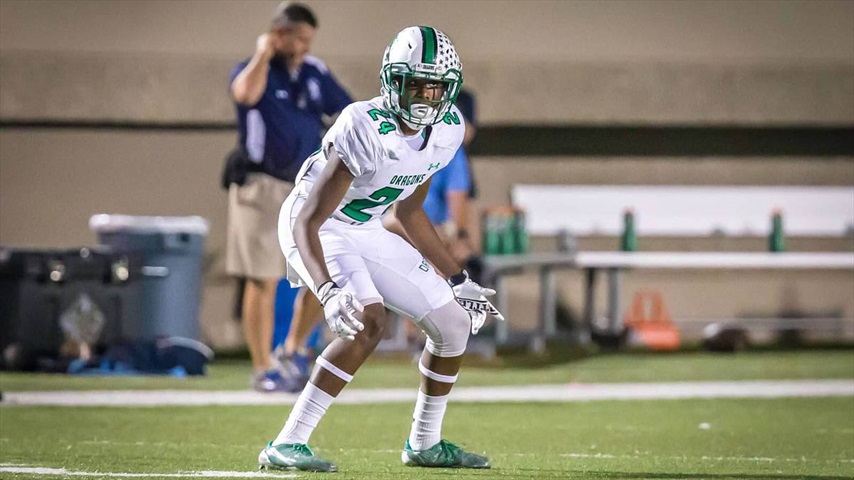
The head coach believed RJ had the physical talent to play varsity as a freshman, but wasn’t convinced he could handle the coaching or mental part of the game at that level.
“I said, ‘Well, give him a shot and if he can’t do it, you can move him back down to JV, but I can tell you right now he can handle the constructive criticism for sure,’” Ray Mickens remembers.
Mickens was right.
“He came back and said, ‘You’re right. We got on him real hard and he responded,’” Mickens says. “I knew he would because he already knew how to deal with that. That was the big thing because freshmen don’t understand a coach yelling at him for the first time.”
RJ showed enough as a freshman to help land early offers from schools like Texas A&M, Alabama, Georgia, Michigan, LSU, Oklahoma State, Tennessee, South Carolina, Mississippi State, Duke, Nebraska, UCLA and Arizona among others. He’d go on to add offers from programs like Notre Dame, Clemson, Ohio State, Oregon, Stanford and Wisconsin soon after.
In the process, Mickens has learned all about how recruiting has changed since he signed with Texas A&M back in 1992.
“First of all, there wasn’t a lot of yous out there,” Mickens laughs to a reporter. “My dad definitely wasn’t getting called by people.”
Mickens has embraced the differences, saying change is good.
“You just have to deal with it the right way,” he continues. “The biggest change is the social media.
“I check his Twitter account, I follow him on Twitter, the things that he posts are right in line with what I’ve talked to him about with social media, which is, ‘Everybody is looking at your tweets. You’ve got to think about the coaches and the teachers and the people who are following you, not just your friends or girls. When you’re shooting this stuff out here, the head coach of Georgia, the head coach of Notre Dame will see this, so just think about that anytime you tweet something out.’ Following his page, he’s focused on football and things like that. I think the priorities are right and nothing is out of line right now.”
Mickens has the resources to get his son to see any school in the country.
“That’s something I didn’t have growing up,” he adds. “Now, he has a broad perspective of all of these schools and he can make the decision that’s right for him, not just a local or regional decision like I had to make. I couldn’t really go anywhere. My parents didn’t have money for that.”
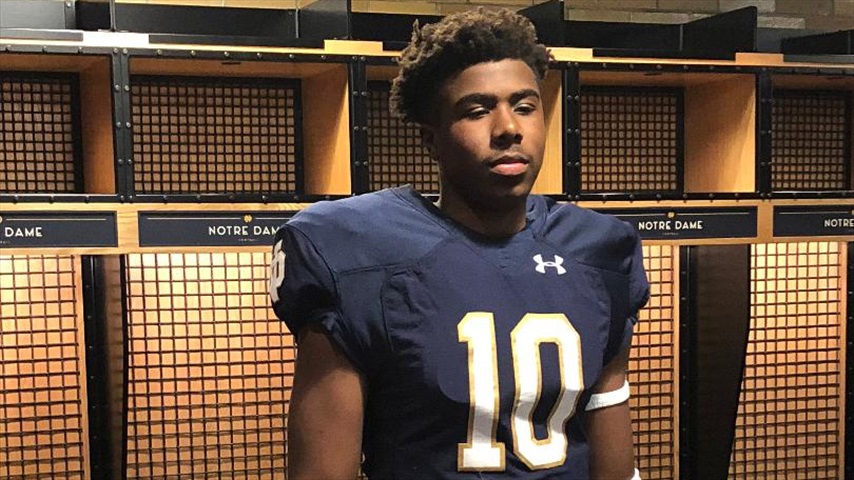
Mickens is also in a unique position to give his son personal advice on picking a college.
“I just tell him all of the time, the school that you choose, ‘If football is taken away from you, would you be happy being a regular student?’” he says. “If the answer is yes, that’s the right school for you. If you’re a regular student and you’re happy, whatever happens in football is just a plus and cream on top.”
Mickens asked himself that question and he was happy with his decision.
“He has to look at it that way instead of how many wins a school has,” he adds.
He also has feelings on what shouldn’t be weighed.
“The biggest thing I think a lot of kids and parents get wrong is making a decision based on the roster,” he says. “The roster changes every offseason. You never know what that roster is going to look like. Even if they don’t have any people at your position and you think you’re good, junior college transfers, graduate transfers, position changes. Even a school that is loaded at DB, like myself.
“When I went to A&M, there were over 20 DBs. We had 11 corners. That wasn’t intimidating because that was the school I wanted to go to. I get there and half of those kids weren’t better than me and a couple of them had grade problems and they ended up not even being eligible. Getting there with 20 DBs, some of my coaches said I made the wrong decision and wouldn’t play for years and I ended up playing as a freshman. You just don’t know what that roster is going to be when you’re there, so don’t trip on looking at the two-deep and the depth chart, that stuff doesn’t matter.”
Like most parents of teen-agers, Ray Mickens isn’t always sure what he says gets through.
“But then I’ll see him doing a couple things later on that I told him or hear him repeat something I said a couple months later and then I know he’s got it,” he says. “He’s really quiet and he listens. I think that’s a good asset to have when you’re young.
“They can’t really see some of the things an adult is trying to tell him because they just have to believe in them.”
Mickens is extremely proud of his son.
“I’m proud of him because he’s making the right decisions so far. You have peer pressure out there, some kids doing the wrong thing and he’s choosing to do the right thing as far as I know. I’m very proud of him off the field more than anything. I know it doesn’t matter how good you are on the field, those off-the-field things can derail you in less than a week. That’s a huge difference from when I played with these cameras and video phones, all of the mess they can get into with that, I’m proud that he hasn’t gotten into any of that.”
